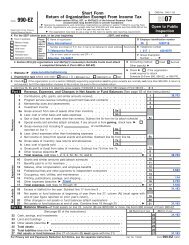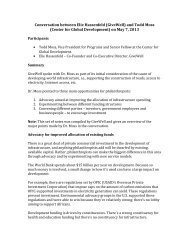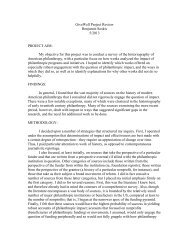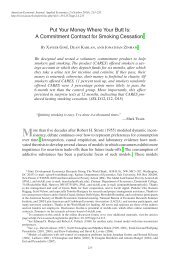Getting In Staying On Moving Up - GiveWell
Getting In Staying On Moving Up - GiveWell
Getting In Staying On Moving Up - GiveWell
You also want an ePaper? Increase the reach of your titles
YUMPU automatically turns print PDFs into web optimized ePapers that Google loves.
GETTING IN, <strong>Staying</strong> on, <strong>Moving</strong> <strong>Up</strong> 17<br />
might be open. After years of working in<br />
the field, the VFI job developers often<br />
receive inquiries directly from employers.<br />
The job developer typically sends three<br />
resumes for every one position available,<br />
under a general cover letter that explains<br />
the <strong>Moving</strong> <strong>Up</strong> program (each job developer<br />
has a fax machine). If the employer is<br />
new to VFI, the job developer will usually<br />
send the most highly qualified candidate,<br />
the “door opener,” in the hope of enticing<br />
the employer into a longer relationship<br />
with the program. Large employers with<br />
regularly available entry-level positions are<br />
the job developers’ lifeblood, and they will<br />
do anything to keep such companies loyal.<br />
If a new employee from VFI fails at a job,<br />
endangering the business relationship, “I’ll<br />
send roses if I have to,” said one job developer.<br />
Anything to maintain the pipeline.<br />
Sometimes job developers will make a presentation<br />
to VFI clients about what to<br />
expect in the job application process, but<br />
more commonly their face-to-face contact<br />
with students is limited to the mock job<br />
interview. They then discuss the interview<br />
with the student afterward on the telephone<br />
and may schedule additional interviews for<br />
other job possibilities. Occasionally, a job<br />
developer might counsel the client and<br />
offer advice and support, but that is mostly<br />
the role of case managers and career advisors.<br />
<strong>In</strong> total, about 87 percent of all enrollees<br />
complete classroom training, amounting to<br />
some 250 graduates per year. VFI graduates<br />
approximately 11 classes a year, depending<br />
on funding streams, and makes an effort to<br />
spread the start of classes evenly throughout<br />
the year to avoid having large clusters<br />
of participants searching for jobs at the<br />
same time. There are, however, busier periods,<br />
and job developers prepare for these<br />
crunch times by lining up interview slots<br />
and job openings before they have even<br />
met many of their clients. Says one job<br />
developer, “You’ve got to be ready; you<br />
don’t want anyone to fall through the<br />
cracks.” While graduating classes take up<br />
much of the job developers time for three<br />
months of each year, the rest of the time<br />
goes to clients who have already been<br />
placed in jobs but have lost them or who<br />
are seeking advancement opportunities—<br />
“upgrades,” in VFI’s parlance.<br />
Program graduates are placed in a wide<br />
range of jobs, depending in part on their<br />
course training and work experience. The<br />
majority of participants find work in business<br />
services. Fifty-one percent of VFI<br />
trainees work for business in such jobs as<br />
administrative assistant, bookkeeper and<br />
file clerk. Twenty percent are placed in the<br />
hospitality industry; 15 percent find jobs in<br />
the retail sector and about 10 percent in<br />
building maintenance.<br />
Career Advisors in the Lead<br />
At about the same time students are meeting<br />
with job developers, they are also getting<br />
to know a career advisor who will<br />
become their main support through the<br />
placement process and two years of followup.<br />
Whereas the case manager supported

















